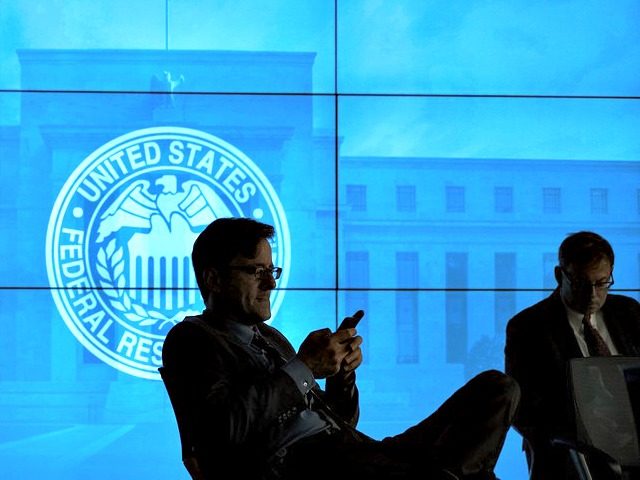Federal Reserve Bank of Atlanta President Raphael Bostic said Tuesday that inflation is likely to last longer than expected and should no longer be called “transitory.”
Bostic is the first Fed official to so clearly break from the central bank’s leadership on inflation. Fed chair Jerome Powell has insisted for months on describing inflation as transitory, although he recently admitted that it could last into next year. The Biden administration has also repeatedly claimed, without evidence, that inflation would only be transitory.
It was not immediately clear if Bostic’s break with the Fed’s transitory mantra represents a broader change in thinking at the Fed or the development of a rift between officials.
Breitbart News has argued for months that inflation could no longer be considered transitory, if it ever could, and is instead likely to stick around.
“You’ll notice I brought a prop to the lectern,” Bostic said in a speech to the Peterson Institution for International Economics. “It’s a jar with the word ‘transitory” written on it. This has become a swear word to my staff and me over the past few months. Say ‘transitory’ and you have to put a dollar in the jar.”
Bostic argued that the word “episodic” better describes pandemic-induced price swings than “transitory.” He said he still believes that the price hikes are tied to the supply chain disruptions stemming from the pandemic and will eventually unwind as the global economy adjusts. But it is becoming increasingly clear that the intense and widespread supply chain disruptions will not be brief, Bostic said.
This creates a risk that longer supply “bottlenecks” and extended price pressures will reshape the expectations of consumers and companies, pushing up their expectations of prices and wages. On Tuesday, the New York Fed released a report showing that consumer expectations of inflation had hit a record high. The Atlanta Fed will release a report on business expectations of inflation on Wednesday and the Department of Labor will release its Consumer Price Index for September.
Bostic said that a softening in the Consumer Price Index last month should not be taken as a sign that inflation risks have diminished. Instead, it appears that inflation is broadening from a few categories to the rest of the economy.
“I believe the evidence is mounting that price pressures have broadened beyond the handful of items most directly connected to supply chain issues or the reopening of the services sector. If we scrutinize that report, we see that three-quarters of the CPI consumer market basket rose at rates higher than 3 percent during August,” Bostic said.
That echoed Breitbart’s analysis from August.
But the White House and the Fed should be careful about declaring “mission accomplished” when it comes to inflation. Because while the extreme price movements in some items may have peaked in May and June, inflation seems to be broadening out and in the process is likely becoming stickier.
Current conditions justify the removal of the Fed’s emergency monetary policy aid, starting with the reduction of monthly purchases of $120 billion of bonds, Bostic said.
Bostic is a voting member of the Fed’s monetary policy-setting Federal Open Market Committee.

COMMENTS
Please let us know if you're having issues with commenting.